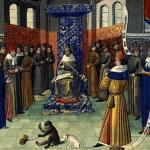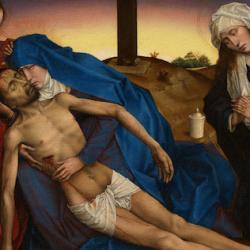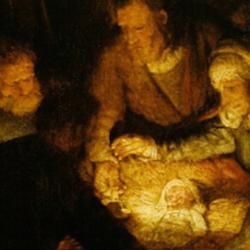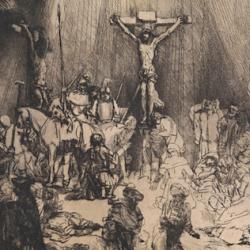Who is the main character of the Passion story? Jesus, of course. But who is Jesus? Who was tried by Pontius Pilate, tortured, and crucified? That is the central question in all the debates about the incarnation in the early church.
Those early debates got highly very technical. Debates raged about the meaning of philosophical terms like “nature” and “person” and “essence” and “substance.” Fine distinctions were drawn between person and essence. As the debates went on, the language got even more technical.
It’s easy to get lost in all this, but at the heart of it all was a basic question about the gospel. The question comes up in various ways. Sometimes the debate was about the question of the birth of Jesus: Who was born of Mary? Sometimes, it was about the hunger, pain, weakness of Jesus.
When Jesus slept in the bottom of a boat, who was sleeping? When Jesus fasted for forty days in the wilderness and was hungry, who was hungry? When Jesus wept at the tomb of Lazarus, who was weeping?
Fundamentally, the questions focused on the last days of the life of Jesus. Who was tried by Pontius Pilate? Who suffered and was buried? Who hung from the cross, and who cried out “My God, my God, why have you forsaken me”? All the early heresies were elaborate efforts to avoid saying the unsayable, that God was on the cross. All the heretics tried to stuff a protective buffer between God and Jesus.
Arius avoided saying that God suffered and died by saying that Jesus was not God in the full sense of the word in the first place. Arius placed the buffer between God the Father and God the Son. Only the former was the high God, God in the complete sense of the term. The Son was something less.
Arius believed that we could be saved only by an atoning death, and he also confessed that a merely human death would not suffice to take away sin. At the same time, he couldn’t bring himself to believe that God Himself could take flesh, suffer, and die on a cross.
So he said that the Son was not eternal God, but only a high creature. The Son was everything that a creature could possibly be; he was a perfect creature. But Jesus could not be God. The one thing that Arius could never say was, “God died on the cross.”
By the time of Nestorius in the fifth century, the Arian option was no longer available. Nestorius had to move the buffer. He didn’t place the buffer between God the Father and God the Son, as Arius had done. He placed the buffer between the Son and His human flesh.
The specific debate sparked by Nestorius didn’t focus on the cross but on the birth of Jesus. Nestorius refused to say, “Mary is God-bearer.” He thought it absurd to believe that Mary, a human, could have borne the Son of God.
As his opponents saw it (perhaps unfairly), Nestorius was teaching that the birth of Jesus was an event in the life of the humanity of Jesus, but not an event in the human life of the Son of God. That meant, of course, that their life not one life. It meant that the story of the humanity and the story of the Son of God were different stories, though they overlapped and interpenetrated at various points. The same logic applied to the cross.
Who died on the cross? Nestorians say, The humanity of Jesus. Meanwhile, the Son of God is kept carefully shielded from that suffering.
The heretics made sense. After all, how can God suffer and die? They made sense, but the orthodox insisted they were wrong. Impossible as it seemed, the church proclaimed, the One who suffered on the cross was none other than God the Son in human flesh, none other than the Creator become a creature.
For centuries, Christians have confessed this orthodox “nonsense” every week. Trace back the antecedents of the pronouns in the Nicene Creed. “And in one Lord Jesus Christ, the only-begotten Son of God . . . very God of very God . . . being of one substance with the Father . . . who for us men and for our salvation came down from heaven and was incarnate . . . and was crucified for us under Pontius Pilate.”
Who is on the cross? It is none other than the only-begotten Son of God, very God of very God, the Son who is “one substance” with the Father, the One who created all things. That Son of God died on a cross.
\This is a breathtaking statement, but not just about Jesus. It is a breathtaking statement about God. What kind of God is it who can (and did) take flesh, who can be born of Mary, who can hunger and thirst and be tempted, who can stand on trial before a Roman governor, who can endure torture and beatings, who can be hung on a cross, who can die, who can cry to His Father in anguish?
What kind of God do we worship who can (and did) share fully in our weakness and sufferings, who can share even our death, and yet not be overcome by death but instead overcome it?
Christians worship a God revealed by and defined according to the gospel. To paraphrase N. T. Wright: To say that the crucified Jesus is God is to make a remarkable statement about Jesus. It is also to make an astonishing statement about God.












